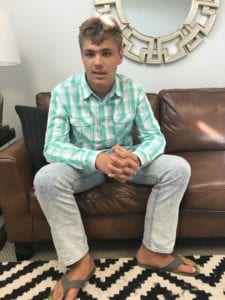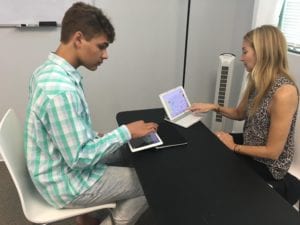By: Sheryl Rosin Ph.D.,CCC-SLP, Owner/Director of Palm Beach Speech-Language Specialists, CAS and Trainer for IBCCES, Adjunct Professor, Nova Southeastern University
 Meet Dominik
Meet Dominik
I have been working with individuals with autism for 20 years and have met many interesting and exciting people along the way. In this blog, I have someone that I would like to introduce to you that I believe is an extraordinary person. His name is Dominik and he is 14-years-old. Dominik has diagnoses of autism and apraxia and is essentially non-verbal with his spoken language, but is definitely NOT non-verbal when using other means to communicate aside from the spoken word. Upon meeting Dominik, you may assume that he has limited communication skills, but since we presume competence when working with our clients, I learned that the opposite it true. Dominik has a passion for writing and using language to communicate his vast interests. One of the ways he has learned to do this is through an augmentative communication application called “Speak for Yourself (SFY).” SFY runs as a communication device on the iPad and uses synthetic speech to aid individuals with their expressive language output. It is based on core vocabulary and allows the person to communicate using generative language. Dominik has learned to use the augmentative communication system to express his wants and needs, feelings, hold conversations with others, and to communicate his expansive knowledge and interests in a variety of topics. Our conversations using AAC have ranged from the etiology of autism to future careers. Dominik thinks that vaccines “are the culprit of autism” and wants to be “a neurologist” when he is older. When Dominik communicates using AAC, he let us into his amazing world of thought. Not only does he use SFY; he can type on a computer keyboard, write with facilitated assistance, and is now starting to use verbal speech as AAC has been a bridge to developing spoken language for him.
I told Dominik that I was going to write a blog about his AAC use and the amazing progress he has made in just a few short months. He was very excited about the opportunity! I asked him if there was anything that he would like to share with the readers and this is what he said:
“I would like to thank you for the opportunity of participating in this blog and having my “voice” heard. It may sound ironic since my oral language skills are almost nonexistent. The various specialists have called my condition apraxia of speech, but I call it “being mute!”

Dominik and Dr. Rosin, having a conversation using AAC
I obviously can’t represent everyone who is autistic and has apraxia of speech, but I think it is reasonable to conclude that there are other individuals similar to me, with similar issues and struggles. The daily struggles of trying to produce the words and the inability to do it successfully represent a great source of frustration and can lead to the lack of self-esteem, both of which have occurred in my case. My refuge has been a written word, and lately the synthetic speech app I have installed on my I-pad. When I was diagnosed with autism almost 12 years ago, there were essentially no programs or apps like the ones we have nowadays and the one I use currently. With the further advancement of technology, I believe that even more sophisticated apps will be developed in the near future!
I truly hope that society will become even more understanding and successful in helping us, the individuals with autism and apraxia of speech, in all aspects of our lives, but the speech in particular, since that is a hallmark of our disorder and the stigma we carry. People with autism and apraxia may not have a loud voice in decibels, but those who are willing to give us a chance may realize that our inner voice is worth listening!”
Dominik has shared two of his writings with me and would like to share them with you too. Please click on the links below to read two essays that he wrote for school.
“Happy and Crabby at the Same Time” By Dominik Knez
“Triple Epiphany” By Dominik Knez
Contact Sheryl:
OCT